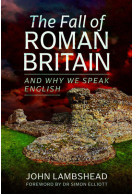The Fall of Roman Britain and Why We Speak English
A new book by John Lambshead
Foreword by Dr Simon Elliott
Britain was the Wild West of the Roman Empire. A marginal province at best, it was always a place of difference, the never-conquered far north, requiring an always over-large military presence. Given that Britannia was so far from Rome, this later made it a hotbed for usurpers and troublemakers. Further, when imperial indifference did eventually catch up with the later diocese in the early fifth century AD, its unmanaged ‘first Brexit’ set in place the conditions that ensured Britain would remain a place of difference set against its continental neighbours to this day.
For many generations the displacement of Romano-British culture in the south and east of the former Roman diocese with that originating in northern Germany has been acknowledged, if not well understood. Indeed, a fierce debate continues in academia to this day about whether this process of change involved entire peoples migrating to Britain in the fourth and fifth centuries AD, or simply societal elites, and everything in between. When I was growing up, this discussion was simply framed in the context of Angles, Saxons and Jutes, and the dates of their arrivals in various part of Britain. Today, our understanding of who these people were, and the process by which they arrived, is far more complicated, and indeed controversial.
In this new and brutally honest appreciation of Roman Britain, and especially its end, Dr John Lambshead shines a welcome new light on this complicated and divisive subject. In particular, he forensically examines newly available – and potentially game-changing – genetic data to see how this matches our existing understanding of the arrival of German culture in Britain as the Roman occupation here ended. To date, this has been a subject dominated by endless reinterpretations of archaeological data. That is now changing, with real answers emerging.
In that regard Dr Lambshead shows how, far from this being a dry academic subject of little interest to the wider public, the understanding of our post-Roman origins is actually very relevant to our modern world. For example, as Dr Lambshead details, in Britain today we speak a German language and have common law codes originally based on those of the incoming Germans of this period. As a counterpoint, on the continent in France, Italy and Spain, Romance languages are spoken based on Roman vulgar Latin, and the law codes are based on those of the Romans. There is a reason for this difference, and it is all rooted in the ending of the Roman presence here in Britain.
The Fall of Roman Britain (Hardback)
and Why We Speak English
The end of empire in the island of Great Britain was both more abrupt and more complete than in any of the other European Roman provinces. When the fog clears and Britain re-enters the historical record, it is, unlike other former European provinces of the Western Empire, dominated by a new culture that speaks a language that is neither Roman nor indigenous British Brythonic and with a pagan religion that owes nothing to Romanitas or native British practices.Other ex-Roman provinces of the Western Empire in Europe showed two consistent features conspicuously absent from the lowlands of Britain: the dominant language was derived from the local Vulgar Latin and the dominant religion was a Christianity that looked towards Rome. This leads naturally to the question: ‘what was different about Britannia?’ A further anomaly in our understanding lies in the significant dating mismatch between historical and archaeological data of the Germanic migrations, and the latest genetic evidence. The answer to England’s unique early history may lie in resolving this paradox.
John Lambshead summarizes the latest data gathered by historians, archaeologists, climatologists and biologists and synthesizes it all into a fresh new explanation.








